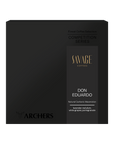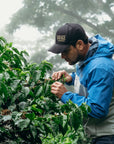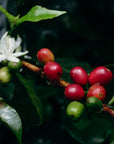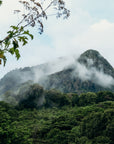The process for this Don Eduardo Estate Green Tip Geisha started with harvesting perfectly ripe cherries, registering 21-24 on the BRIX meter. These cherries were twice sorted and selected before being deposited into hermetically sealed, stainless steel tanks, where they remained for upwards of 100 hours.
During this period, CO2 was introduced at regular intervals amid a controlled and regulated fermentation environment, allowing the coffee seeds to absorb high fruit notes and finer aromatics from the cherry itself. Temperature and PH were monitored throughout this duration, ensuring these variables stayed within pre-defined limits.
Following their extended stay inside the sealed tanks, the cherries were removed and laid out on the three-tiered, raised African bed system designed by Jamison. Temperatures, humidity, and airflow were also maintained within specific parameters in the shaded drying areas, also referred to as dry houses, as the cherries were consistently and carefully shifted throughout the day for even drying. These steps were carried out to prevent undesired microbial activity from occurring and to promote the development only of desired flavors.
The cherries spent around 20 days in the drying phase before reaching the proper moisture level of approximately 11%. To protect the quality that had painstakingly been created, they were then bagged in Grain-pro and stored under optimal conditions of cool and stable temperatures for a reposo or seasoning process critical in Jamison's stringent end-to-end QC protocol.
In reposo, the coffee's moisture content stabilized while allowing it to keep absorbing more flavor from its parchment or shell, before being hulled and further sorted by size, density, and color, and finally shipped to us.
About the Panama Geisha
Panama Geisha, of which Green Tip Geisha is one variation, is a rare, delicate, and complex variety well-loved for its sweet florality and citrus highlights. Since its debut win at the Best of Panama auction in 2004, it has kept specialty coffee lovers everywhere captivated by its endless possibilities, delicacy, complexity, and clarity of flavors. As such, it is often showcased on coffee competition stages by a great number of coffee champions, and it also continues to fetch the highest prices.
While a coffee’s truest intrinsic qualities are still largely believed to be showcased best by traditional washed processing due to the demucilaging, washing, and scrubbing steps removing all traces of fruit from the bean, the expertise of seasoned and passionate producers like Jamison Savage allows them to direct the flavor character of the Panama Geisha towards a seemingly endless diversity of delightfully surprising trajectories.
They do this through the purposeful implementation of traditional methods like the natural and honey processes, as well as intentional and innovative processing styles, such as this Natural Carbonic Maceration process, which add to the complexity of the cup’s character — for example, more layers of flavor or better mouthfeel — without compromising its inherent qualities from terroir and variety.












